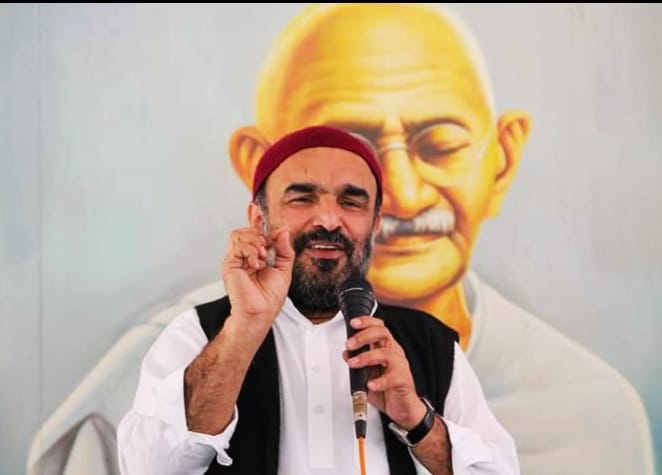
Faisal Khan’s fast & his pursuit of peace through Khudai Khidmatgar

Usually dressed in a Pathani suit, a skull cap, and sometimes, a jacket, Faisal Khan cuts an ordinary figure. His manner, like his speech, is simple but scratch the surface, and you realise that there is nothing ordinary about this man. The 46-year-old leader of the Khudai Khidmatgar [Pashto for Servants of God] movement has just ended a six-day fast against violence and hatred, but that hasn’t dulled his compassionate spark even a little. In fact, he glows with even more conviction in his belief that mohabbat [love] is the way out of this communal mire we find ourselves in.
A fast to rouse the conscience
Khan undertook this fast alongside another young peace activist and Khudai Khidmatgar member, Kripal Singh Mandloi, and together they re-lived this Gandhian method in Delhi, where the organization is headquartered. The fast started on January 13 and ended on 18, 2022 in commemoration of the last fast of Mahatma Gandhi. Like his idol, Khan intended to rouse public conscience and consciousness against the rising instances of communal hatred and violence in India today.
But Khan and Mandloi weren’t by themselves shouldering this endeavour. Support poured in virtually from all quarters, and Gandhiji’s granddaughter Tara Gandhi dropped in with the kheer that Khan and Mandloi broke the fast with. Khan’s break-of-fast event was also attended by Sant Narayan Das from Vrindavan and it was supported by mahant Swami Shivanand Singh, the head of the Matra Sadan ashram in Haridwar.
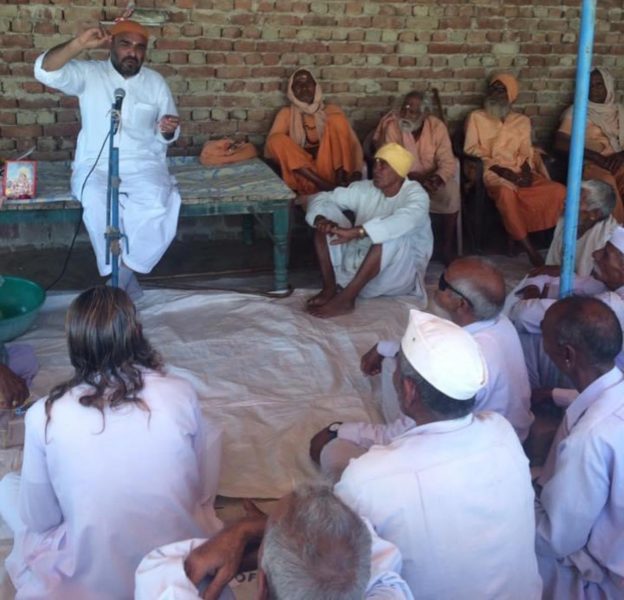
A leaf out of every (faith) book
A mahant speaking up in support of a Muslim may seem like an anomaly in present-day India, where hateful dharma sansads are being held and mosques routinely being destroyed with impunity, but this is common in Faisal Khan’s world. In 2020, when Khan was arrested for ‘offering namaz inside a temple allegedly inciting communal trouble’ (he was granted bail eventually), the man was simply on a Mathura parikrama. He was unfazed then, and he is unfazed now. He treats hatemongers the way one would treat the ill–with patience and love. “Hate is not the natural state of being,” he says, “it is unnatural and dangerous, and we must care about those afflicted.”
Those who are familiar with Khan’s philosophy and work will know how he quotes (and believes in!) as easily from Tulsidas’ Ramcharitmanas as he does from the Koran or from Kabir’s dohas. Borrowing liberally from all manner of scripture, he reiterates that the true purpose of religion and faith is fostering unity and love among mankind.
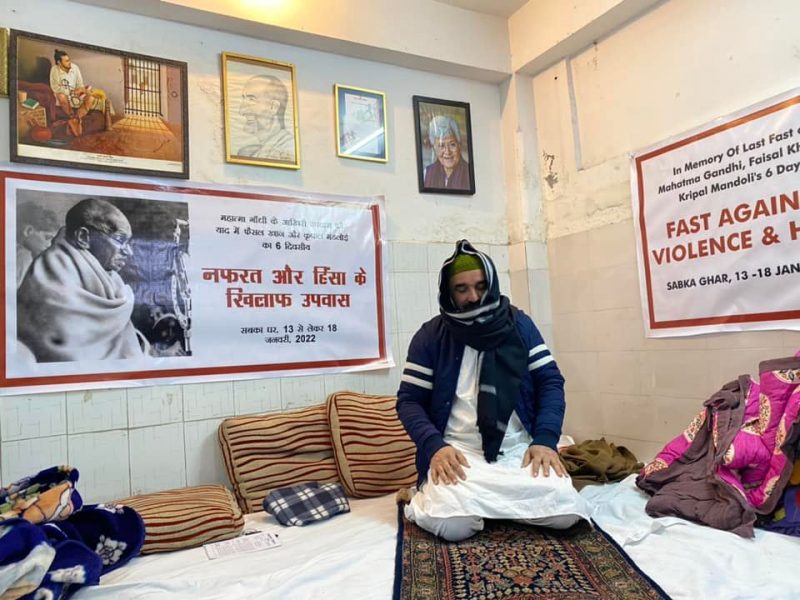
Rukmini Iyer, a peacebuilder from Mumbai says: “The first time I heard Faisal bhai was when the situation around India was very polarised and the tensions between Hindus and Muslims were rising. The way he put the force of love above the idea of religion, and yet did that by engaging with religion, was inspiring. In many ways, listening to him healed my own relationship with religion and following his work continues to do so.”
Khan’s message of love is so compelling precisely because it is so fundamental. He quotes Kabir on this to reiterate how godliness is to be found in the simple act of loving, and not lofty philosophy: चारिउं वेदि पठाहि, हरि सूं न लाया हेत। बालि कबीरा ले गया, पंडित ढूंढे खेत॥ (A pandit reads all four Vedas but still finds no God| Kabir walks away with the crop, while the pandit searches the fields). No wonder, his message has been reaching and touching the masses.
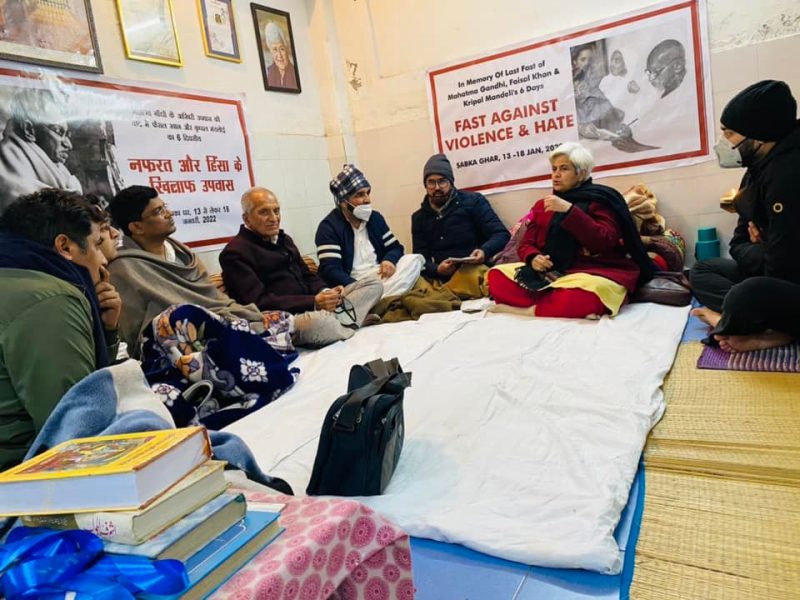
Gandhi and Frontier Gandhi
It helps that the sociology postgraduate and Gandhian practice what he preaches. An inspired teenager, he seriously got into social activism when he joined Medha Patkar’s National Alliance of People’s Movements (NAPM) in 2002. He is still the national convenor of NAPM, while also being a national executive member at Socialist Party of India and executive committee member at Krishi Gau Sewa Sangh in Wardha. But the work that has earned him most admiration and followership is the one does at Khudai Khidmatgar – an organization he revived in 2011.
Originally founded by Khan Abdul Ghaffar Khan, also known as Badshah Khan or Frontier Gandhi in the 1920s, it gained prominence as a Pashtun non-violent resistance movement against British imperialism. In its new avatar as a humanitarian organisation in New Delhi, Khudai Khidmatgar serves to promote communal peace and harmony across the country. Since its inception 10 years ago, the organization has been engaged in numerous peace campaigns and activities, such as fasts against communal lynching, cycle yatras for peace, bus tours, candle marches, relief material distribution and refuge through Sabka Ghar – a community living space, etc. And most remarkably, as Khan says, “We have no funding, no FCRA, no financial support of any kind. But we aren’t worried, because people with goodwill continue to join the movement.”
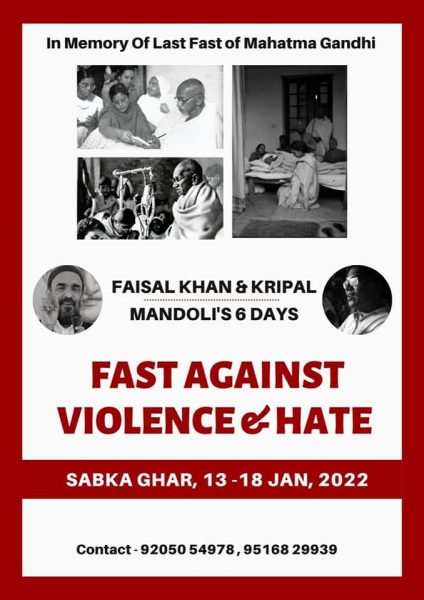
Today, there are more than 50,000 Khudais across India, and together, they continue to relay the candle of interfaith harmony in cities and communities. No matter how shrill and hateful the voices from the fringe, the force of good faith shines through, thanks to leaders like Khan who walk the peaceful talk.

